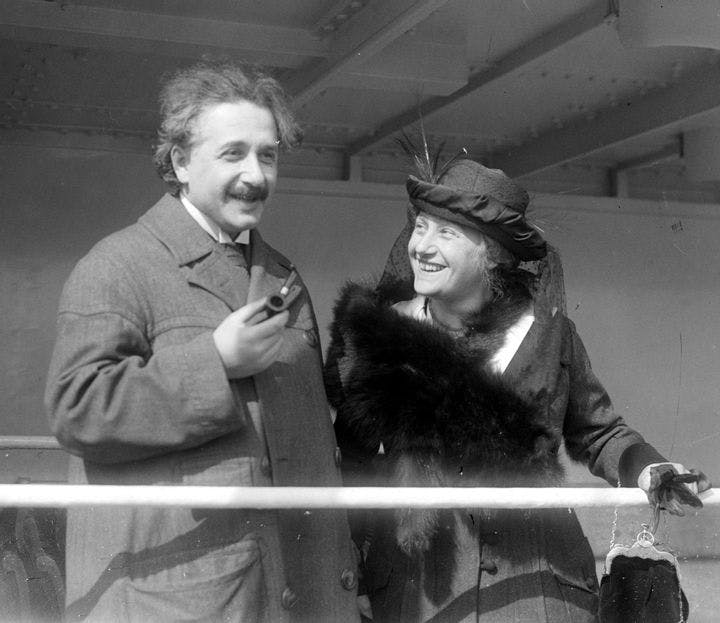Fall 2008
Einstein, Relatively Speaking
– David Lindley
Hans C. Ohanian's analysis of Einstein's works, "reveals himself to be the kind of strictly logical, step-by-step physicist that Einstein plainly was not, and Ohanian's inability to cope with that difference almost seems to have turned into a personal animosity."
Physicists sometimes indulge in an entertaining but largely pointless debate about which of their two preeminent geniuses, Isaac Newton or Albert Einstein, deserves the all-time number one ranking. Hans Ohanian has no doubts on the matter. Newton is worth several Einsteins, he tells us, although it would have been more in keeping with the frequently pedantic spirit of his book if he had let us know exactly how many Einsteins—three? four and a quarter?—stack up to one Newton. At one point, Ohanian even suggests that Einstein wasn’t quite up to the level of Max Planck, the founder of quantum theory, but by the end of Einstein’s Mistakes he has restored Einstein to the number two position. Putting Einstein in his place seems, at any rate, to be Ohanian’s main purpose.
Though recent biographies have largely dispelled the cherished myth that Einstein was a dunce at school, it is true that the great physicist was not a natural mathematician. After making the enormous conceptual leap that connected the phenomenon of gravitation to the fact that space-time is curved, it took Einstein many excruciating years to find the appropriate mathematical expression for this idea and thereby create the theory of general relativity. Einstein’s earlier attempts, some published, some abandoned, contained deep flaws. In his other revolutionary achievements too, Einstein’s first pronouncements were rarely the last word. Over the years, those original insights were painstakingly polished to become the scientific theories we know today, and often it was other physicists—more rigorous than Einstein, if less imaginative—who filled in the gaps and supplied the finishing touches.
This, by and large, is nothing more than how science ordinarily progresses, but Ohanian, a former editor at the American Journal of Physics and author of several textbooks, seems intent on finding in the missteps and fudges of Einstein’s papers a new and shocking portrait of the man. Einstein’s pre-1905 efforts “have faded into the obscurity they richly deserve.” He made blunders in his great works of 1905 because he “was not thinking like a physicist, but like a patent clerk.” A mistake in the first attempt to prove that E = mc2 “is the sort of thing every amateur mathematician knows to watch out for.” And so on.
There is, to be sure, the germ of an interesting story here. Einstein’s arguments were often makeshift and occasionally shoddy, but most of the time he knew where he wanted to go and found a way to get there. That, as Ohanian
admits, is one definition of genius, but he shows little interest in pursuing the thought. Instead, facing up to the evident truth that Einstein repeatedly hit on answers to difficult puzzles before he could figure out a convincing justification for them, Ohanian can only throw up his hands and declare that Einstein was “a mystic in the throes of a revelation.” In his minute analysis of Einstein’s works, Ohanian reveals himself to be the kind of strictly logical, step-by-step physicist that Einstein plainly was not, and Ohanian’s inability to cope with that difference almost seems to have turned into a personal animosity.
This is a scientific rather than a personal study, but still, Ohanian finds time to mention the less attractive aspects of Einstein’s character: his shabby treatment of his first wife, his neglect of his children, his tendency to slight his colleagues’ scientific contributions, his dreadful sartorial sense, his love of certain disgustingly heavy German foods. Only in the later chapters, when the aging Einstein has come to America to spend his final years working fruitlessly on a “theory of everything,” does the tone soften. An eccentric, rather lonely figure, Einstein turns at last into a dotty old uncle whom Ohanian can regard with pity instead of scorn.
* * *
David Lindley is the author of Uncertainty: Einstein, Heisenberg, Bohr, and the Struggle for the Soul of Science.
Reviewed: Einstein's Mistakes: The Human Failings of Genius by Hans C. Ohanian, Norton, 394 pp, 2009.
Photo courtesy of The Library of Congress
